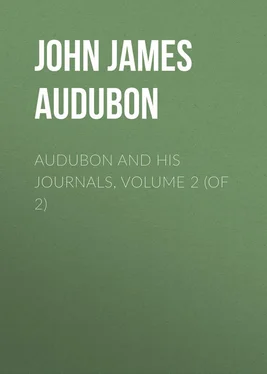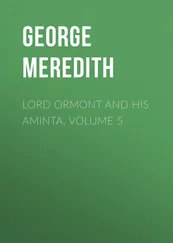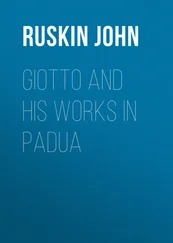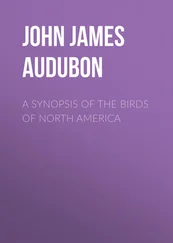John Audubon - Audubon and his Journals, Volume 2 (of 2)
Здесь есть возможность читать онлайн «John Audubon - Audubon and his Journals, Volume 2 (of 2)» — ознакомительный отрывок электронной книги совершенно бесплатно, а после прочтения отрывка купить полную версию. В некоторых случаях можно слушать аудио, скачать через торрент в формате fb2 и присутствует краткое содержание. Жанр: foreign_antique, foreign_prose, на английском языке. Описание произведения, (предисловие) а так же отзывы посетителей доступны на портале библиотеки ЛибКат.
- Название:Audubon and his Journals, Volume 2 (of 2)
- Автор:
- Жанр:
- Год:неизвестен
- ISBN:нет данных
- Рейтинг книги:5 / 5. Голосов: 1
-
Избранное:Добавить в избранное
- Отзывы:
-
Ваша оценка:
- 100
- 1
- 2
- 3
- 4
- 5
Audubon and his Journals, Volume 2 (of 2): краткое содержание, описание и аннотация
Предлагаем к чтению аннотацию, описание, краткое содержание или предисловие (зависит от того, что написал сам автор книги «Audubon and his Journals, Volume 2 (of 2)»). Если вы не нашли необходимую информацию о книге — напишите в комментариях, мы постараемся отыскать её.
Audubon and his Journals, Volume 2 (of 2) — читать онлайн ознакомительный отрывок
Ниже представлен текст книги, разбитый по страницам. Система сохранения места последней прочитанной страницы, позволяет с удобством читать онлайн бесплатно книгу «Audubon and his Journals, Volume 2 (of 2)», без необходимости каждый раз заново искать на чём Вы остановились. Поставьте закладку, и сможете в любой момент перейти на страницу, на которой закончили чтение.
Интервал:
Закладка:
July 17, Monday. A beautiful day, with a west wind. Sprague, who is very industrious at all times, drew some flowers, and I have been busy both writing and drawing. In the afternoon Bell went after Rabbits, but saw one only, which he could not get, and Sprague walked to the hills about two miles off, but could not see any portion of the Yellowstone River, which Mr. Catlin has given in his view, as if he had been in a balloon some thousands of feet above the earth. Two men arrived last evening by land from Fort Pierre, and brought a letter, but no news of any importance; one is a cook as well as a hunter, the other named Wolff, a German, and a tinsmith by trade, though now a trapper.
July 18, Tuesday. When I went to bed last night the mosquitoes were so numerous downstairs that I took my bed under my arm and went to a room above, where I slept well. On going down this morning, I found two other persons from Fort Pierre, and Mr. Culbertson very busy reading and writing letters. Immediately after breakfast young McKenzie and another man were despatched on mules, with a letter for Mr. Kipp, and Owen expects to overtake the boat in three or four days. An Indian arrived with a stolen squaw, both Assiniboins; and I am told such things are of frequent occurrence among these sons of nature. Mr. Culbertson proposed that we should take a ride to see the mowers, and Harris and I joined him. We found the men at work, among them one called Bernard Adams, of Charleston, S.C., who knew the Bachmans quite well, and who had read the whole of the "Biographies of Birds." Leaving the men, we entered a ravine in search of plants, etc., and having started an Owl, which I took for the barred one, I left my horse and went in search of it, but could not see it, and hearing a new note soon saw a bird not to be mistaken, and killed it, when it proved, as I expected, to be the Rock Wren; then I shot another sitting by the mouth of a hole. The bird did not fly off; Mr. Culbertson watched it closely, but when the hole was demolished no bird was to be found. Harris saw a Shrike, but of what species he could not tell, and he also found some Rock Wrens in another ravine. We returned to the fort and promised to visit the place this afternoon, which we have done, and procured three more Wrens, and killed the Owl, which proves to be precisely the resemblance of the Northern specimen of the Great Horned Owl, which we published under another name. The Rock Wren, which might as well be called the Ground Wren, builds its nest in holes, and now the young are well able to fly, and we procured one in the act. In two instances we saw these birds enter a hole here, and an investigation showed a passage or communication, and on my pointing out a hole to Bell where one had entered, he pushed his arm in and touched the little fellow, but it escaped by running up his arm and away it flew. Black clouds now arose in the west, and we moved homewards. Harris and Bell went to the mowers to get a drink of water, and we reached home without getting wet, though it rained violently for some time, and the weather is much cooler. Not a word yet from Provost and Squires.
July 19, Wednesday. Squires and Provost returned early this morning, and again I give the former my journal that I may have the account of the hunt in his own words. "As Mr. Audubon has said, he left Provost, Basil, and myself making ready for our voyage down the Yellowstone. The party for the fort were far in the blue distance ere we bid adieu to our camping-ground. We had wished the return party a pleasant ride and safe arrival at the fort as they left us, looking forward to a good supper, and what I now call a comfortable bed. We seated ourselves around some boiled Buffalo hump, which, as has been before said, we took good care to appropriate to ourselves according to the established rule of this country, which is, 'When you can, take the best,' and we had done so in this case, more to our satisfaction than to that of the hunters. Our meal finished, we packed everything we had in the skiff, and were soon on our way down the Yellowstone, happy as could be; Provost acting pilot, Basil oarsman, and your humble servant seated on a Buffalo robe, quietly smoking, and looking on the things around. We found the general appearance of the Yellowstone much like the Missouri, but with a stronger current, and the water more muddy. After a voyage of two hours Charbonneau River made its appearance, issuing from a clump of willows; the mouth of this river we found to be about ten feet wide, and so shallow that we were obliged to push our boat over the slippery mud for about forty feet. This passed, we entered a pond formed by the contraction of the mouth and the collection of mud and sticks thereabouts, the pond so formed being six or eight feet deep, and about fifty feet wide, extending about a mile up the river, which is very crooked indeed. For about half a mile from the Yellowstone the shore is lined with willows, beyond which is a level prairie, and on the shores of the stream just beyond the willows are a few scattered trees. About a quarter of a mile from the mouth of the river, we discovered what we were in search of, the Beaver lodge. To measure it was impossible, as it was not perfect, in the first place, in the next it was so muddy that we could not get ashore, but as well as I can I will describe it. The lodge is what is called the summer lodge; it was comprised wholly of brush, willow chiefly, with a single hole for the entrance and exit of the Beaver. The pile resembled, as much as anything to which I can compare it, a brush heap about six feet high, and about ten or fifteen feet base, and standing seven or eight feet from the water. There were a few Beaver tracks about, which gave us some encouragement. We proceeded to our camping-ground on the edge of the prairie; here we landed all our baggage; while Basil made a fire, Provost and I started to set our traps – the two extremes of hunters, the skilful old one, and the ignorant pupil; but I was soon initiated in the art of setting Beaver traps, and to the uninitiated let me say, ' First , find your game, then catch it,' if you can. The first we did, the latter we tried to do. We proceeded to the place where the greatest number of tracks were seen, and commenced operations. At the place where the path enters the water, and about four inches beneath the surface, a level place is made in the mud, upon which the trap is placed, the chain is then fastened to a stake which is firmly driven in the ground under water. The end of a willow twig is then chewed and dipped in the 'Medicine Horn,' which contains the bait; this consists of castoreum mixed with spices; a quantity is collected on the chewed end of the twig, the stick is then placed or stuck in the mud on the edge of the water, leaving the part with the bait about two inches above the surface and in front of the trap; on each side the bait and about six inches from it, two dried twigs are placed in the ground; this done, all's done, and we are ready for the visit of Monsieur Castor. We set two traps, and returned to our camp, where we had supper, then pitched our tent and soon were sound asleep, but before we were asleep we heard a Beaver dive, and slap his tail, which sounded like the falling of a round stone in the water; here was encouragement again. In the morning (Monday) we examined our traps and found – nothing. We did not therefore disturb the traps, but examined farther up the river, where we discovered other tracks and resolved to set our traps there, as Provost concluded that there was but one Beaver, and that a male. We returned to camp and made a good breakfast on Buffalo meat and coffee, sans salt, sans pepper, sans sugar, sans anything else of any kind. After breakfast Provost shot a doe. In the afternoon we removed one trap, Basil and I gathered some wild-gooseberries which I stewed for supper, and made a sauce, which, though rather acid , was very good with our meat. The next morning, after again examining our traps and finding nothing, we decided to raise camp, which was accordingly done; everything was packed in the skiff, and we proceeded to the mouth of the river. The water had fallen so much since we had entered, as to oblige us to strip, jump in the mud, and haul the skiff over; rich and rare was the job; the mud was about half thigh deep, and a kind of greasy, sticky, black stuff, with a something about it so very peculiar as to be rather unpleasant; however, we did not mind much, and at last got into the Yellowstone, scraped and washed the mud off, and encamped on a prairie about one hundred yards below the Charbonneau. It was near sunset; Provost commenced fishing; we joined him, and in half an hour we caught sixteen catfish, quite large ones. During the day Provost started to the Mauvaises Terres to hunt Bighorns, but returned unsuccessful. He baited his traps for the last time. During his absence thunder clouds were observed rising all around us; we stretched our tent, removed everything inside it, ate our supper of meat and coffee, and then went to bed. It rained some part of the night, but not enough to wet through the tent. The next morning (Tuesday) at daylight, Provost started to examine his traps, while we at the camp put everything in the boat, and sat down to await his return, when we proceeded on our voyage down the Yellowstone to Fort Mortimer, and from thence by land to Fort Union. Nothing of any interest occurred except that we saw two does, one young and one buck of the Bighorns; I fired at the buck which was on a high cliff about a hundred and fifty yards from us; I fired above it to allow for the falling of the ball, but the gun shot so well as to carry where I aimed. The animal was a very large buck; Provost says one of the largest he had seen. As soon as I fired he started and ran along the side of the hill which looked almost perpendicular, and I was much astonished, not only at the feat, but at the surprising quickness with which he moved along, with no apparent foothold. We reached Fort Mortimer about seven o'clock; I left Basil and Provost with the skiff, and I started for Fort Union on foot to send a cart for them. On my way I met Mr. Audubon about to pay a visit to Fort Mortimer; I found all well, despatched the cart, changed my clothes, and feel none the worse for my five days' camping, and quite ready for a dance I hear we are to have to-night."
Читать дальшеИнтервал:
Закладка:
Похожие книги на «Audubon and his Journals, Volume 2 (of 2)»
Представляем Вашему вниманию похожие книги на «Audubon and his Journals, Volume 2 (of 2)» списком для выбора. Мы отобрали схожую по названию и смыслу литературу в надежде предоставить читателям больше вариантов отыскать новые, интересные, ещё непрочитанные произведения.
Обсуждение, отзывы о книге «Audubon and his Journals, Volume 2 (of 2)» и просто собственные мнения читателей. Оставьте ваши комментарии, напишите, что Вы думаете о произведении, его смысле или главных героях. Укажите что конкретно понравилось, а что нет, и почему Вы так считаете.












